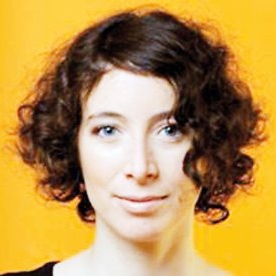
News

Disruptive and female: Israeli authors tell a different story
JULIE LEIBOWITZ
The dominant narrative in Israeli literature was masculine right up until the 1980s, Levine said, by which time greater receptivity to the female voice had developed.
Levine, an expert on literature, including Hebrew literature and modern Israeli culture, brought the audience’s attention to the works of three “innovative, iconoclastic” female authors: Orly Castel Bloom, Dorit Rabinyan, and Ayelet Gundar-Goshen. They have all published fairly recently, and their books have been translated into numerous languages, including English and Arabic.
These women are creating a new self-awareness in Israel. They are challenging the hegemony of male thought, and the appropriate story to tell, transforming “history” to “herstory”, Levine said. Nevertheless, like other Israeli authors, their work reflects the pressure of living in a war zone for so many years, and the siege mentality that goes with it.
Castel Bloom’s first book, Dolly City, (published in 1992), interrogates society’s views of motherhood, and criticises expectations of selflessness. The book is so disturbing, Levine said, she knew of a reader who “threw it out of her apartment window”.
Her latest book, Textile, (2008) once again looks at the agony of motherhood, this time of a soldier’s mother who is waiting for news of her son. The mother submits herself to numerous plastic surgeries – the last of which is shoulder-blade implants – to anaesthetise herself from the anxiety.
The book reveals deep psychic agony without any secure borders. The male characters, one of whom is a narcissist, are pretty absent in this book, which focuses on three generations of women. It reflects on what freedom, accomplishment, and purity mean, among other things.
Dorit Rabinyan’s first book, Persian Brides, (2000), is set in Iran, where Rabinyan’s family comes from. Revealing the rich tapestry of Sephardi life, it is appealing for being a nostalgic look at a society no longer in existence, Levine said.
Her latest book, All the Rivers, (2014), is a memoir of her “passionate but untenable” relationship with a Palestinian artist, told through fictionalised characters. The book attained fame in 2015, when it was banned by the Israeli education minister from the high school education curriculum for promoting intermarriage.
Rabinyan is a consummate storyteller, Levine said, whose brave story integrates the personal and political. Interestingly, in this book, the third protagonist is the city – New York – as it is only in a foreign city that this relationship can play out.
It combines strangeness and intimacy, and conveys the loyalty and pride of the families on both sides. There is the sense of the power of having a secret Arab lover, together with a sense that it is ephemeral.
The youngest of the three writers, Ayelet Gundar-Goshen’s book, Waking Lions, (2017) was the winner of the Jewish Quarterly Wingate Prize. It is a riveting, dramatic book that makes us confront our social prejudices, said Levine.
In the book, the protagonist mistakenly kills an Eritrean immigrant, and leaves the scene of the crime, only to be confronted by the dead man’s wife – with surprising consequences.
It focuses on how we deal with undesired life changing events, Levine said, and interrogates issues of bias, guilt, illegal immigrants, and the social underbelly.
Central to the book is the juxtaposition of two strong and courageous women, the wives of protagonist and victim.
A good story shows us what makes us human, Levine said. It gives us insight into what makes us do what we do. Good literature should make us ask questions. These three female authors show different ways of exploring the prohibitions and panorama of contemporary Israeli society, its evolution, and changing moral fabric.




